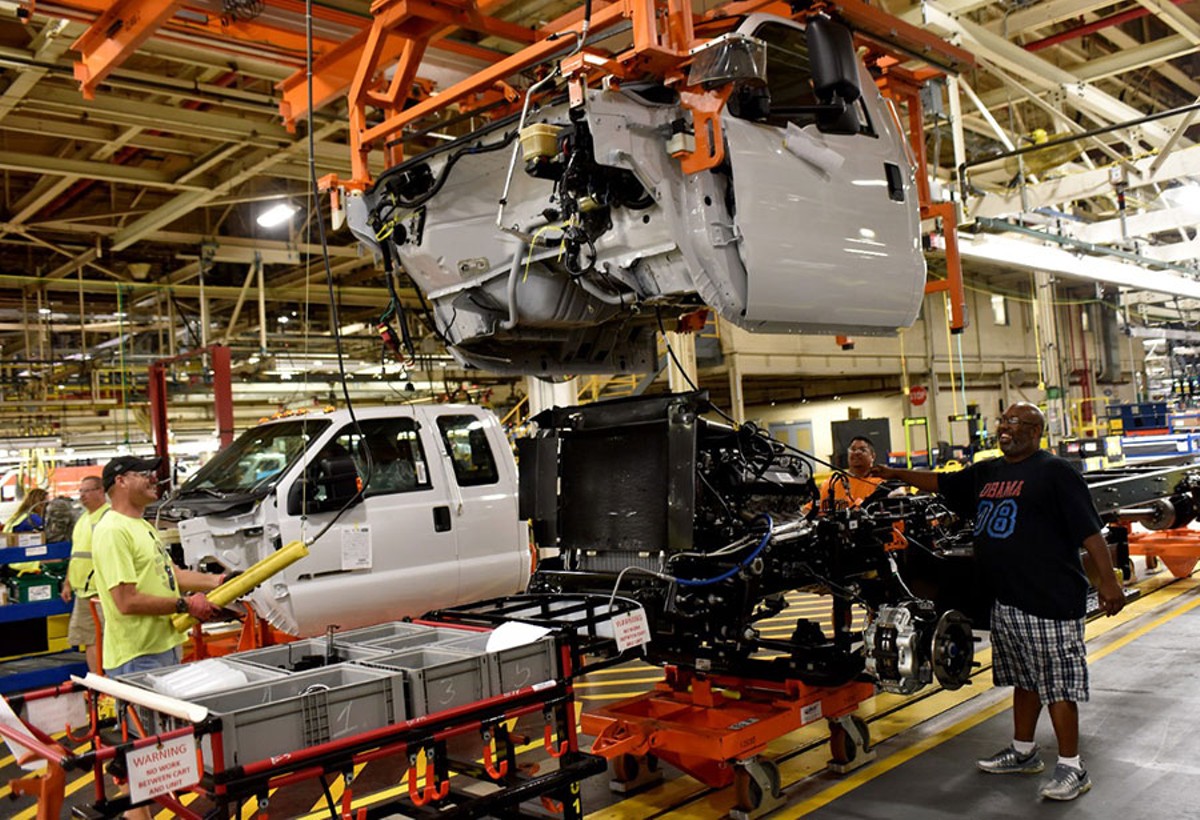NAFTA, the North American Free Trade Agreement, was never popular in Detroit. "There goes my job," a student who was an auto worker told me when it was passed in 1994.
Indeed, there are far fewer manufacturing jobs now in the United States than there were then — about 5.5 million fewer. Dan Ujczo, an international trade and customs attorney in Columbus, Ohio, told me last year that "I seldom hear NAFTA mentioned in Michigan without another word starting with 'F' in front of it." (That word is not, in case you wondered, fantastic.)
When he was campaigning for president, Donald Trump vowed to pull the United States out of NAFTA, the three-way free trade agreement between the United States, Canada, and Mexico.
"The worst trade deal in history," he bellowed. Later, he decided to try to renegotiate NAFTA instead, threatening all the while to pull the U.S. out if he didn't get what he wants.
Trump's anti-NAFTA stand probably made him more popular among many of the white blue-collar voters in Michigan, Pennsylvania, and Wisconsin, who switched parties and gave him his upset victory in the presidential election.
But now for the truth: NAFTA actually may have saved the auto industry, not destroyed it.
Sure, there was short-term pain, and the Clinton Administration certainly did not level with workers about the effects the agreement would have.
Some did lose jobs, although far fewer due to NAFTA alone than most people think. Robert Lawrence, a professor of government at Harvard University's Kennedy school, has calculated that the total was probably less than 150,000.
Very often, NAFTA has been blamed for jobs that would have been lost anyway, thanks to globalization.
But what the trade alliance did do was create a far stronger production and assembly operation involving all three countries. "The right way to think about it is that Ford would be out of business [without NAFTA]," Gary Hufbauer, a senior fellow at the Peterson Institute for International Economics, told CNN.
They were saved when times got tough, he added, largely because of their operations in Mexico. That NAFTA was actually good for the auto industry may be hard for some to believe.
Regardless, however — why not pull out of it now? Ford, General Motors, and the division of Fiat known as Chrysler are all doing great and making billions.
But the fact is that without NAFTA, the U.S. automotive companies would face disaster. The Center for Automotive Research, known as CAR, is a nonprofit think tank devoted to high-quality research of the auto industry.
I've been reading their reports for years, and they are superb. If they have any slight bias, it is in favor of the domestic auto industry, but they are rigorously honest.
Last month, CAR came out with an impressive "NAFTA Briefing" document, which was a comprehensive review of the proposals on the table and their potential impacts.
The report's main author was Kristin Dziczek, the vice president of CAR's labor and industry group, and it was very blunt about what would happen if either NAFTA fell apart — or if the other two countries gave in to Trump's demands: Potential disaster.
You wouldn't think the United States would offer to change NAFTA in a way that would damage our own automotive industry. But then, we've never had a president like Trump, who doesn't know much, doesn't know or care about what he doesn't know, and follows blind instinct.
Trump demanded, at the outset of the renegotiations, that the agreement's "rules of origin" be changed to require that 50 percent of the parts in any car made in the three NAFTA countries be from America. Plus, 85 percent of the parts in those cars have to be from a NAFTA country, or no free trade.
They'd have a tariff slapped on them, in other words. Currently, only 62.5 percent of any car manufactured in Mexico, the United States, or Canada must come from NAFTA countries.
There's evidently no rule about what percentage of the components have to come from the U.S. Well, Trump's demands probably sound pretty good to a laid-off auto worker.
Unfortunately, they make no sense. Over the nearly quarter-century since NAFTA was enacted, an efficient system has developed that has not only united all three countries, but has produced considerable benefits to both the corporations and the commoners.
Here's one little-known example: According to the U.S. Bureau of Labor Statistics, the cost of living has gone up 86 percent since NAFTA was approved. But the cost of a new vehicle has risen only seven percent.
What would happen if, all of a sudden, NAFTA vehicles all had to have at least half American-made parts?
Trump's idea would blow up in our faces. "The current U.S. proposal would disrupt the market," the CAR study said. If the goal is bringing manufacturing back to the United States and the NAFTA region, "it could have the opposite effect if the content targets are set too high or the rules are too onerous."
The likely consequences would be that "at least 46 and as many as 125 vehicle [models] would be disqualified from trade," or rather, from tariff-free NAFTA trade.
That would mean they'd have to pay a tariff that would add hundreds, and in some cases, thousands, to the price of each car. Instead of doing that, CAR thinks they may just scram to somewhere "even further offshore with an even lower chance of there being any U.S. content in the resulting product."
But what if the United States were to just pull out of NAFTA and go our own way? Well, Henry Ford the First is dead and the time when that could have worked is long gone.
"The U.S. cannot self-supply," the CAR report noted. We can't even build enough to meet domestic demand. In 2017, U.S. production totaled 11 million units; sales were 17.3 million.
America imported 8.7 million vehicles last year and exported 2.4 million. NAFTA is a well-oiled machine.
That machine isn't perfect, of course, and the fact is that some parts of it did need to be reopened. Douglas George, Canada's consul general in Detroit, told me recently that NAFTA has all sorts of rules about cassette tape players in cars, which of course haven't been made for years.
But there's nothing at all about the digital economy, which essentially didn't exist in the dial-up modem world of 1994.
Lately, U.S. negotiators have shown some more of what diplomats call "creativity" on the rules of origin, and negotiators seem more encouraged about actually getting an agreement.
They need to do that soon: Mexico faces presidential elections July 1, and for obvious political reasons, the ruling party wants this substantially finished by then.
How this will wind up is still not clear, but it is clear that the days when nations could blandly turn tariffs on and off like a spigot are a part our recklessly romantic past.
The last thing this country needs is a trade war — especially with two nations whose automotive and manufacturing economies are essentially interwoven with ours.
Unless, that is, we feel we just have to experience the delights of the Great Depression for ourselves.
Stay on top of Detroit news and views. Sign up for our weekly issue newsletter delivered each Wednesday.






